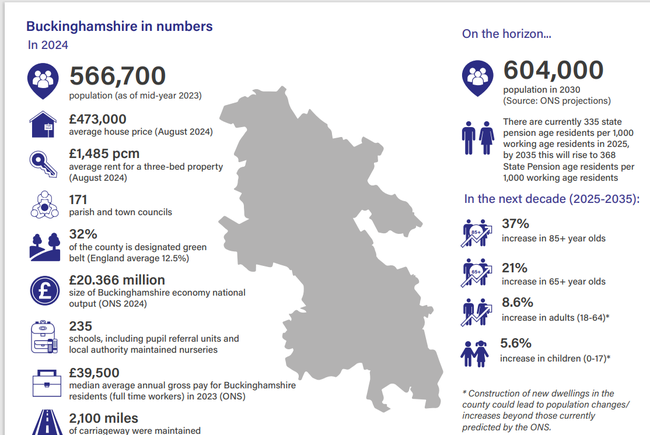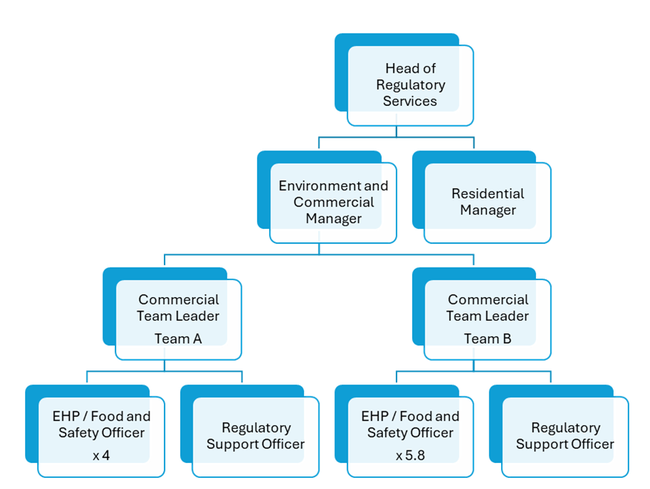Joint Food and Health and Safety Service Plan 2025 to 2026
3. Background
3.1. Profile
Buckinghamshire Council is a unitary authority. It covers an area of 1,874 km2 and has a population of approximately 566,700 (mid 2023). It is predominantly a rural area with towns and villages set in countryside, a large area of which forms part of the Chilterns Area of Outstanding Natural Beauty and part of the Greater London Green Belt. 32% of the area is designated as green belt. The main towns are Aylesbury, Buckingham, High Wycombe, Marlow, Amersham and Beaconsfield.
The county has good transport links with adjoining areas. There are good national and motorway networks and direct rail-links to central London or northwest via Aylesbury or High Wycombe and the Midlands, provided by Chiltern Railways, Great Western Railways and London Underground. There is significant development of future network links including HS2 and East-West Rail which continues to have a major impact across the county.

3.2. Organisational structure
The Regulatory Service encompasses Environmental Health, Trading Standards and Licensing Services. This service sits within the Communities Directorate. The senior management structure is comprised of a Chief Executive, corporate and service directors and heads of service. The Head of Regulatory Services reports to the Director of Transport and Regulatory Services and has delegated powers to act on behalf of the Council in relation to food and health and safety. Trading Standards is a shared service with Surrey County Council.
In October 2024, the service underwent a review which resulted in a restructuring of the teams as well as a redesignation of posts and the addition of an additional post to the establishment in recognition of the service pressures faced with growing numbers of food premises registering in the county.
The Environmental Health service is divided into two specialist teams; Environment and Commercial, and Residential that operate from Council offices in High Wycombe and Aylesbury. The food and health and safety service is delivered by the Commercial Teams that operate across the county.
As of April 2025, the Commercial Team comprises of 14.8 allocated full time equivalents (FTE). This is made up of 12.8 FTE ‘suitably qualified’ officers and 2 FTE Regulatory Support Officers.
All food services are delivered by in-house staff, except where food analytical services are used. Casual staff or contractors are used on occasions to support our work and help us manage variances in demand and vacant posts which we are actively recruiting to.

Environmental Health organisational chart
A Consultant in Communicable Disease Control at the United Kingdom Health Security Agency (UKHSA) - Thames Valley is appointed as the 'Proper Officer' for the Authority.
3.3. Customers, stakeholders and partners
Our customers include:
- local residents
- businesses
- trade and commerce organisations
- visitors to the area
Our stakeholders include:
- internal departments
- staff members
- Community Boards
Our partners include:
- statutory organisations
- local authorities
- Central Government
- voluntary groups
- Primary Authority Partners
- event organisers
3.4. Scope of the service
The scope of the service is:
i) the enforcement of legislation relating to safety, welfare and hygiene.
ii) routine inspection and auditing of businesses in accordance with current Government requirements.
iii) providing support, training and advice for food handlers and businesses, either free of charge or as part of a paid-for advice service.
iv) participation in the Primary Authority Partnership scheme.
v) investigation of consumer complaints relating to food safety and hygiene.
vi) investigation of employee and public complaints and requests for information relating to working environments and standards.
vii) investigation of reportable accidents.
viii) management of the Safety Advisory Groups in relation to public events and sports ground safety.
ix) health education and promotional activities to educate the consumer.
x) investigation of sporadic cases and outbreaks of infectious disease within the district, in consultation with the Consultant in Communicable Disease Control.
xi) drawing up and implementing appropriate contingency incident and outbreak control plans.
In addition, officers also enforce the smoke-free provisions, undertake the registration and inspection of businesses and operators carrying out skin piercing activities and issue sports ground safety certificates.
The service is delivered from the council offices in Aylesbury and High Wycombe during normal office hours of 9am to 5pm. It is recognised that businesses operate outside normal office hours of work and so the inspection programme does take this into account. Officers are therefore required to work outside these hours as needed, for example, for food poisoning investigations and accident investigations, where the nature of the business dictates evening or early morning visits and upon request by businesses.
3.5. Demands on the service
As of 1 April 2025, there are 5189 food premises requiring an intervention in the Buckinghamshire district ranging from international manufacturers to home caterers. The number of premises falling into each risk category is given in Table 1. Classification of premises aligns with Food Standards Agency Code of Practice.
Category A businesses, either because of the nature of their operation or poor standards of hygiene, pose a greater risk than category E. Those premises within category E are subject to an alternative enforcement strategy which takes the form of a self-assessment questionnaire. Non-rated businesses are those whose risk rating has not yet been assessed.
The high number is a direct consequence of the COVID pandemic, at which time only businesses that posed the highest risk were inspected. Premises outside the programme are those businesses that, for example, trade in our area but are registered elsewhere for example mobile traders.
| Risk category | Number of premises | Interval between inspections (months) |
|---|---|---|
| A | 3 | 6 |
| B | 110 | 12 |
| C | 750 | 18 |
| D | 1780 | 24 |
| E | 1899 | Alternative Enforcement Strategy |
| Non-rated | 629 | |
| Outside programme | 18 | |
| Total | 5189 |
Approved establishments are food premises that prepare and handle foods of animal origin for sale or supply to other businesses. These premises must meet additional legislative food safety requirements and will generally require greater officer resource than other food premises.
Within the premises profile, there are 26 food businesses that are approved:
| Dairy Products | 10 |
|---|---|
| Egg/Egg Products | 6 |
| Cold store storing Products of Animal Origin (POAO) | 3 |
| Meat Products and Meat Preparations | 4 |
| Rewrapping of products of animal origin (POAO) | 1 |
| Other (meals) – products containing products of animal origin (POAO) | 2 |
The service continues to receive a high number of new food business registrations, particularly low risk operations. During 2024/25, 903 new food business registrations were received, an increase of 183 on the previous year.
The service provides health export certificates to several manufacturers within the area to assist with the export of products of fish or plant origin to countries that require these to be accompanied by a certificate issued by the official food control authority i.e. Buckinghamshire Council. These often require bespoke certificates to meet the specific needs of the client and country receiving the products. Health certificates are provided for companies that have received an inspection or audit of the premises and this service is charged for, depending on the work required to issue the certificate. The authority has a flexible approach to determining whether each consignment would need to be physically checked, based on existing records or the outcomes of previous official controls. Since the UK’s exit from the European Union, this service continues to place demand on resources. In 2024/25, 601 export health certificates were issued.
The inspection of businesses in terms of health and safety follows the Health and Safety Executive/Local Authorities Enforcement Liaison Committee (HELA) Local Authority circular LAC 67/2 (2025/2026) i.e. a business will not be subject to any proactive interventions unless it comes within one of the priority subject areas or local intelligence suggests the need for a targeted intervention.
The Environmental Health Service also has responsibility for the issue of the General Safety Certificate for the Designated Sports Ground at Wycombe Wanderers Football Club and works closely with West Northamptonshire Council on the safety certificate for Silverstone Circuit. In addition, the team also administers the registration for skin piercing establishments and operators to ensure the safety of workers and those using their services.
3.6. Enforcement policy
A generic enforcement policy covers the majority of the work performed by the Service. However, a more specific enforcement policy has been developed and is detailed within the Food and Health and Safety Enforcement Policies, together with enforcement procedures that set out the actions to be taken when formal action is required.
Regard is given to the Regulators’ Code published by the Office for Product Safety and Standards, the Primary Authority Partnership Scheme and the council’s overarching enforcement policy.
2024/25 saw the successful completion of two health and safety prosecutions following investigations into accidents (workplace transport and fall from height) which resulted in total fines of £70,000 and total costs of £24,297 were awarded.